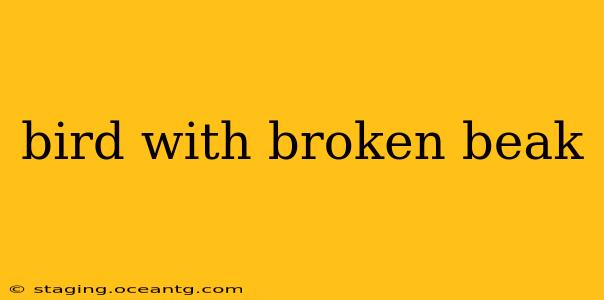Finding a bird with a broken beak is distressing, but understanding the situation is the first step towards helping the feathered friend. A broken beak can significantly impact a bird's ability to eat, drink, and defend itself, making prompt and appropriate action crucial. This comprehensive guide explores the causes, treatment options, and recovery process for birds suffering from beak injuries.
What Causes a Broken Beak in Birds?
Several factors can lead to a broken beak in birds, ranging from natural occurrences to human intervention. Understanding the cause can help in prevention and treatment.
- Predation: Attacks from predators, such as cats, larger birds, or even snakes, are a common cause of beak injuries. The force of the attack can result in fractures or complete beak breakage.
- Collisions: Birds, especially those in urban environments, can collide with windows, cars, or other objects, resulting in beak fractures.
- Trauma: Falls from heights, fights with other birds, or accidental trapping can inflict significant damage to the beak.
- Disease: In some cases, underlying diseases can weaken the beak structure, making it more susceptible to fractures. Certain infections or nutritional deficiencies can contribute to this vulnerability.
- Improper Handling: Rough or careless handling by humans can inadvertently lead to beak injuries, especially in smaller or more delicate bird species.
How Do I Know if My Bird Has a Broken Beak?
Recognizing the signs of a broken beak is essential for timely intervention. Look for these indicators:
- Visible Fracture: A clear crack, break, or deformity in the beak is the most obvious sign.
- Bleeding: Bleeding from the beak is a serious indicator of a fracture or other injury.
- Swelling: Swelling around the beak area may accompany a fracture.
- Difficulty Eating or Drinking: A broken beak makes it painful and difficult for the bird to eat and drink normally. You might observe the bird struggling to pick up food or water.
- Abnormal Behavior: Changes in behavior, such as lethargy, isolation, or excessive preening of the injured area, can indicate a problem.
Can a Broken Beak Heal on Its Own?
This depends heavily on the severity of the break. Minor cracks might heal naturally with time and proper care, but significant fractures often require veterinary intervention. Leaving a severe beak fracture untreated can lead to complications such as infection, malnourishment, and even death.
What Should I Do if I Find a Bird with a Broken Beak?
If you discover a bird with a broken beak, act swiftly and cautiously:
- Safety First: Approach the bird carefully and avoid causing further stress or injury. Use thick gloves if necessary to protect yourself.
- Assess the Situation: Examine the bird for other injuries besides the beak fracture.
- Contact a Wildlife Rehabilitator or Avian Veterinarian: This is crucial for proper diagnosis and treatment. They are equipped to handle injured birds and provide specialized care.
- Provide Temporary Care (Only if Absolutely Necessary and You Have Experience): If immediate veterinary care is unavailable, you can offer a safe, quiet, and dark space. Provide fresh water in a shallow dish and soft, easily digestible food like soaked birdseed. Never attempt to repair the beak yourself.
What is the Treatment for a Broken Bird Beak?
Treatment will vary depending on the severity of the fracture and the bird species. Options may include:
- Splinting or Bandaging: A vet might splint or bandage the beak to stabilize the fracture and promote healing.
- Surgical Repair: In severe cases, surgery might be necessary to repair the beak.
- Pain Management: Pain medication will likely be administered to alleviate discomfort.
- Nutritional Support: The bird will need supplemental feeding to ensure adequate nutrition while the beak heals.
How Long Does It Take for a Bird's Beak to Heal?
Healing time varies greatly depending on the severity of the injury, the bird's age, and overall health. It can take anywhere from several weeks to several months for a broken beak to fully heal. Regular veterinary checkups are essential throughout the recovery period.
Can a Bird Survive with a Severely Damaged Beak?
While a severely damaged beak significantly impacts a bird's quality of life, survival is possible with appropriate veterinary care and ongoing support. The prognosis depends on the extent of the damage and the bird's overall health.
This information is for educational purposes only and should not replace professional veterinary advice. Always consult with a qualified avian veterinarian for the proper diagnosis and treatment of a bird with a broken beak. Early intervention and proper care significantly improve the chances of a successful recovery.
